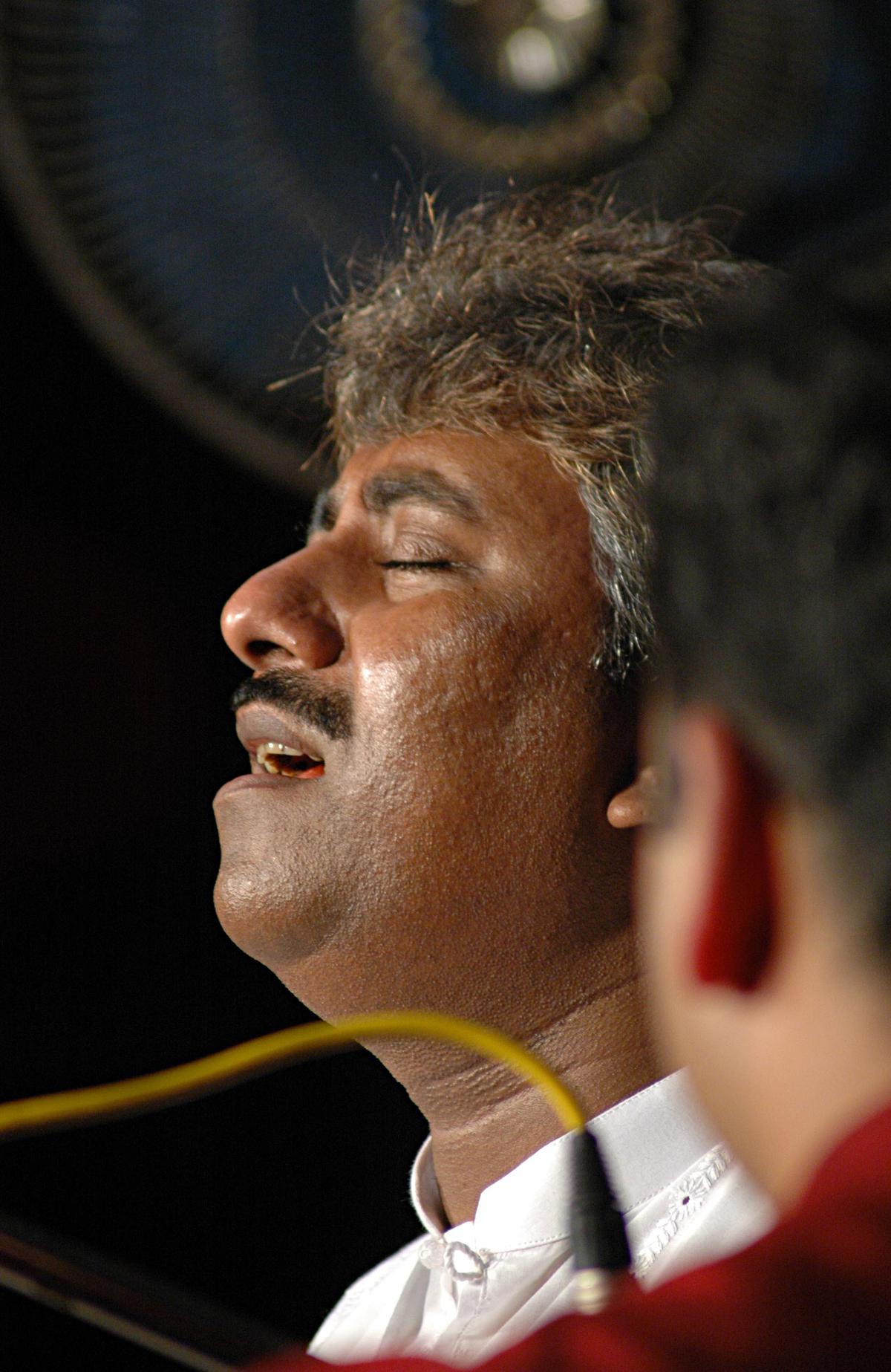Renowned Hindustani singer Rashid Khan performing in Bhubaneswar in 2012.
| Photo Credit: Ashoke Chakrabarty
In the cold winter morning, Kolkata’s upscale Nandan Complex was thronged by people as the flower bedecked Rabindra Sadan was waiting for its most cherished vocalist’s last visit.
The 21-gun salute reminded one that just 10 ten months after the passing of Pt. Vijay Kichlu, Rashid’s indulgent mentor and founder-director of Sangeet Research Academy (SRA), he too has bid adieu.At Vijay Kichlu’s memorial meeting in February 2023, Rashid poured his heart out. Looking unwell and shaken, he reminisced his arrival to Calcutta in 1970s, a decision which changed his life. “It was Vijay uncle who convinced nana (his grandfather Ustad Nissar Hussain Khan) to leave Bareilly In Uttar Pradesh with his select disciples and join SRA as one of its gurus. I came along. One made me part of this loving SRA family while my the other (grandfather) trained me with an iron hand. Whatever I am today, is because of them.”
Ustad Rashid Khan
| Photo Credit:
Special Arrangement
Those days, the academy was housed in a New Alipur building and could barely accommodate the gurus, Ustad Latafat Hussain Khan, Ustad Nissar Hussain Khan and Girija Devi along with their families. Young Rashid, immensely talented but extremely naughty, did not hide his disapproval of the place which literally caged him. To humour and encourage him, Vijay Kichlu and his close friends would ask him to sing whatever he liked. Little Rashid was fond of film songs and would sing popular classical-based numbers of Mohammad Rafi, Talat Mehboob and Manna Dey.
Though Rashid had learnt the rudiments of shastriya sangeet, he didn’t seem to like singing ragas and the rigours associated with the art form; but fell in love with Girija Devi’s thumris and loved to render them along with his favourite Rafi-numbers.
Ustad Rashid Khan with Subhankar Banerjee on the tabla and Jyoti Goho on the harmonium performing at the Music Academy in Chennai on December 31, 2007.
| Photo Credit:
V. GANESAN
Surprisingly, his grandfather did not disapprove of this. Instead, he preferred this ‘chaumukha’ (all-rounder) trait of his disciple.
To escape the taskmaster-grandfather, Rashid once left home. He would often spend nights chatting and laughing with friends at the SRA auditorium. He also used to spend time at the academy’s audio library listening to the recordings of legends. He loved Ustad Amir Khan’s music. He soon discovered the beauty and depth of classical music and refused lucrative offers from the film industry.

Ustad Rashid Khan performing in Kochi on November 28, 2004.
| Photo Credit:
MAHESH HARILAL
His classical recitals attracted even the uninitiated. I have heard him sing Bageshri, Yaman, Multani, Bilaskhani Todi, Darbari, Jogkauns etc on several occasions and every time found a different angle of the ragas’ persona. Once after a nightlong soiree that ended in the wee hours with his heart- wrenching Bilaskhani Todi, dazed by its impact I hopped into a cab not realising that the cabbie, an ardent admirer of Rashid Khan, followed him wherever he performed in Kolkata.
Rashid’s close friend, eminent sarod exponent and composer Tejendra Narayan Majumdar succeeded in making Rashid sing a few Natiya Kalaam tuned by him, titled ‘Naina Piya se’. It was a great success. Soon after there was a beeline of film producers with offers to sing in films. Then ‘aoge jab tum o saajana’ happened and it swept the entire music world off its feet and Rashid became a household name!
Whether a solo recital or duets with greats like Pt. Bhimsen Joshi, or a film song, thumri, ghazal and bhajan, Rashid Khan sang from his heart. Like his idol Ustad Amir Khan, he carved a niche by merging the finer nuances of different gharanas. An intuitive artiste, he couldn’t explain what made him sing a particular phrase, the way he did. He believed, ‘Khuda gaata hai, ham gaate hain (god makes me sing).’